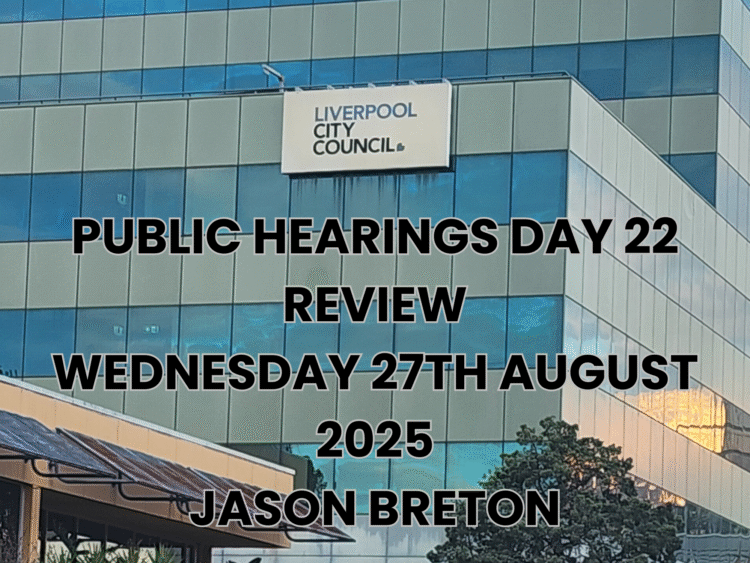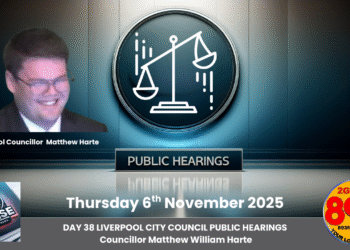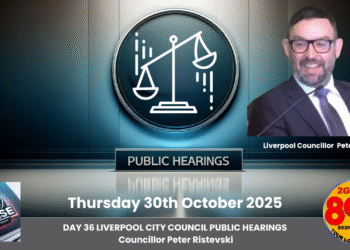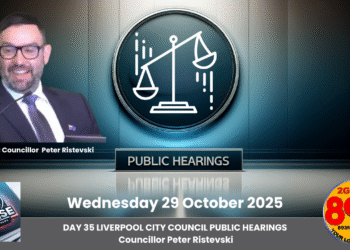Jason Breton’s Testimony: Workplace Health and Safety Training Updates
Mr Breton provided an update on “homework” assigned from the prior day regarding the councillor intranet and workplace health and safety (WHS) training materials. He reported that induction advice from senior counsel Denman (2015) on councillors’ obligations under the Workplace Health and Safety Act was available, and a two-page advisory document was used in inductions prior to more detailed advice from Mr Hodgkinson. Additionally, the Clayton Utz safety advice from 7 July 2025 is now accessible on the councillor intranet portal. However, a challenge remains in tracking whether councillors have completed remedial training. To address this, the council is implementing a learning management system feature requiring councillors to tick a completion box at the end of training modules, similar to staff processes. Following evidence from the previous day, Clayton Utz has been re-engaged to provide training for Mr Ristevski and four Labor councillors who missed the 7 July session, with arrangements already underway.
Code of Conduct Policies and Procedures
A significant portion of the session focused on the council’s code of conduct framework, which operates through two interrelated documents: the Code of Conduct and the Code of Conduct Procedures. Mr Breton confirmed that the current Code of Conduct was adopted on 21 May 2025, with minor updates from the previous version adopted on 30 August 2022. Similarly, the current Code of Conduct Procedures replaced the 31 August 2022 version, also with minor changes. A notable substantive change in both updated documents is the shift of responsibility from the Office of the CEO to the Corporate Support, Legal and Governance Directorate for managing code of conduct complaints, indicating a restructuring of oversight.
Ms McDonald also referenced the Model Code of Conduct for Local Councils 2020, highlighting provisions for special complaints management arrangements with the Office of Local Government. These arrangements can be requested by the general manager if code of conduct complaints impose undue costs, disrupt administration, or hinder council functioning, as outlined in paragraphs 5.48 and 5.49. This discussion suggests potential challenges in managing complaints internally and the option to seek external support, a mechanism relevant to ensuring fair and efficient governance.
Matters of Importance to Liverpool Ratepayers
- Workplace Health and Safety Training Compliance for Councillors
Ratepayers should be aware of the ongoing issues with ensuring councillors complete mandatory WHS training, as highlighted by Mr Breton’s testimony. The inability to easily track whether elected representatives have undertaken necessary training raises concerns about accountability and the council’s commitment to safety obligations. This matters to ratepayers because councillors play a crucial role in decision-making that affects community safety and council operations. If they are not adequately trained, decisions could be made without full awareness of legal or safety implications, potentially leading to costly mistakes or liabilities borne by ratepayers. The proactive steps to implement a completion tracking system and re-engage Clayton Utz for missed sessions are positive, but the initial gaps underscore a need for stronger oversight, directly impacting the trust and value ratepayers place in council governance. - Changes in Code of Conduct Oversight and Complaints Management
The shift in responsibility for code of conduct complaints from the Office of the CEO to the Corporate Support, Legal and Governance Directorate is a significant update that ratepayers should note. This change, coupled with the discussion of special complaints management arrangements with the Office of Local Government, suggests past challenges in handling complaints internally, possibly due to cost or disruption. For ratepayers, this is critical because the code of conduct ensures ethical behavior and transparency among council officials. If complaints are not managed effectively, it risks unchecked misconduct or conflicts of interest, eroding public trust and potentially misusing ratepayer funds. Understanding that there is now a dedicated directorate for governance and an option for external support provides some reassurance, but it also highlights historical inefficiencies that ratepayers have indirectly funded, emphasizing the need for robust, cost-effective accountability mechanisms.
Broader Implications
Mr Breton’s testimony on Day 22 reveals ongoing efforts to improve governance within Liverpool City Council, particularly in areas of training and ethical standards. However, the identified gaps in tracking councillor training and the need for structural changes in code of conduct oversight point to systemic issues that could affect service delivery and fiscal responsibility. These discussions are vital for understanding how the council is addressing accountability and transparency, core concerns for ratepayers who expect their contributions to support effective and ethical local government. The inquiry continues to uncover areas for improvement, with further examination expected in upcoming sessions.
Day 22 Full Transcript – Englishhttps://www.olg.nsw.gov.au/wp-content/uploads/2025/09/Liverpool-City-Council-Public-Inquiry-Day-22.pdf



























